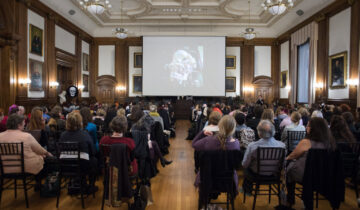For the NEW YORK TIMES: Our son’s birth was not what we anticipated. My wife’s 43-hour labor resulted in an emergency C-section, so the calm birthing pool experience we hoped for never happened. The soothing birth soundtrack we compiled barely got played. Luckily our son was born healthy with no complications for him or my wife, but his infancy quickly became something we hadn’t expected either.
For the first four and a half months of his life, our son had what is commonly referred to as colic. He cried and screamed, so loudly, and so often, that we were convinced our neighbors would call social services. There were few quiet, happy moments to relish.
Our son is now 13 months, the colic storm has passed, and we are enjoying ourselves. There is one snag, though: I’m struggling to shake our colicky past. I have what I have now semi-jokingly diagnosed as post-colic stress disorder, which rears its head in the form of jealousy. I envy other parents whose babies are quiet little angels who let out mere whimpers when they cry, take long naps, enjoy being swaddled, lay in their parents arms without kicking, and are easily soothed with a pacifier.
Our son cried excessively and was inconsolable. During screaming spells, he arched his back, drew up his legs, and refused to be comforted. He hated being swaddled and cuddled. He seemed to be in extreme distress but was otherwise well fed and healthy. We worried. I wore earplugs. Our son’s colic made it difficult for my wife and I to maintain our sense of humor and enjoy his early days.
It’s no wonder that the sound of crying babies is blasted at Navy SEALs to test endurance, and that extreme crying can be linked with child abuse. The relentless screaming made me feel anxious, helpless, frustrated, and even angry. Family and friends tried their best to help, but nothing they said seemed to. Comments like “It just doesn’t make sense,” “why is he doing that?” or “maybe if you hold him a different way” often fueled my anxiety instead of reducing it.
In the US and here in UK, one in five children have colic. There is no known cause, although moms who smoke or have indigestion, migraines, and anxiety are more likely to have colicky babies. Despite claims that colic can be mitigated with family treatment plans, parents simply have to ride it out, which is exactly what we did.
We are now in awe of our son’s happiness, appetite, ability to sleep, and enjoyment of cuddling. Of course he still cries, but far less often, at lower volumes, and for reasons clearly discernable: he’s hungry, tired, teething, or has fallen down. A hug usually does the trick.
But I still talk too much about how colicky our son was and overreact when other parents tell me about their docile little angels. When a friend at our baby swim class told me that her daughter rarely cries and has always taken three-hour naps, my jaw dropped. “Are you [expletive] kidding me?” blurted out of my mouth. When another friend casually plopped their quiet newborn onto a couch cushion and then sat down at their computer sipping tea watching YouTube videos while their baby “chilled,” my head fell into my hands in disbelief. Our baby never “chilled.”
“I’ve got to let it go,” I recently told my wife. But I find it difficult to be happy for couples that have easy babies. I struggle to empathize with their problems, which always seem incrementally smaller than ours were. I want other parents to feel our colicky pain; to know what it’s like to give a baby love and get intense screaming and 30 minute-naps in return. It’s ridiculous and selfish, but this is the form my PCSD has taken.
My wife wonders what his colicky past might mean for his future, although most resources claim there is no correlation. We think we want another child, but colic has shaken our confidence. Both employed and well into our 30s, we’re not sure if we have the energy for another colic battle where the only way to win is to give up on sleep and wait a few months. Everyone says there’s no way we’d have two colicky babies, but how can we be sure?
For now, I’m doing my best to relax, leave it all behind, and enjoy the wonderful, giggly toddler in our life.




Thank you for putting a name to this problem. I have pcsd! My son is 8 now and he’s a delight but I still hate to think of his first year. He was nearly five was his sister was born. I am so glad I had the courage to have another baby. Literally every day I think how I m so lucky to have her. Having a baby is taking a flyer- you just didn’t know that the first time around! Do what is right for you and your family. Ignore every one else. They are not in the trenches with you. All the best. LM
I’m a middle-age (plus) Mom who is now living and thriving 22 years PCSD. I thought I would let you know that there is life after colic, even horrible colic, and it is sweet.
I had a son, who also wasn’t much interested in being born in a timely fashion, and was finally coaxed out by a major episiotomy and a short pair of forceps. He was a few weeks early and a little on the small side but came home with us at 4 lbs and 11oz. He was a darling boy for about 10 days and then he woke up and began to cry. The kind of crying it sounds as though you are familiar with. Major, screaming, tortured baby crying.
He cried from 8:00 PM every night until 1:00AM in the morning. At the beginning he made little lamb-type sounds during the daytime. Odd, quiet braying sounds. And he cried and fussed. But once he got organized he just plain wailed for hours on end. No amount of singing, holding, rocking or walking would quiet him. And like you, we saw our doctor regularly. In fact we went through at least 5 doctors believing that they must be missing something. My Dad, who had been a doctor for many years offered some good advice. He said for us to find a woman doctor who had had children of her own. And that’s what we did. It’s how we discovered that our son was normal, gaining weight and had colic – which the doctor’s child also had years earlier. She suggested that I have a glass of wine and try to relax and know that we were doing a great job. “Where” I asked “was the baby while I was kicking back with a glass of wine?” And she said “On your lap,” because there was nothing else to be done but get through it.
I so pitied myself for having had a child who was so miserable, so unhappy. It seemed that he was in terrible pain. All I could do was try to soothe him. Eventually, while I was reading books on how to care for children with colic, time began to pass. And without really noticing, the crying reduced from 7 days a week to 5. And then to 4 and then to 2 and at about four and a half months, it simply went away. And we were left with the most delightful little boy. Happy, laughing, clever, interested in what we taught him. ‘Loved books and being read to. He craved other children in the park, he smiled and he slept well at nap and bed time.
I can say, that what stuck with him was a kind of fussiness about or sensitivity to tastes, textures and tags in his t-shirts. Those are the only few remnants I see of his sort of internal struggling with the maturation process of his intestines or colin or someplace deep inside. Some kids live with the cramps, or sticky fingers or shoes on the wrong foot — my kid didn’t like sticky, or the wrong shoes and had an issue with the seams on the inside of his socks in first grade. But at 22 he’s very bright, passed his college entrance exams with near perfect scores, has a wicked sense of humor, and is studying screenwriting in his last year at university and minoring in Japanese.
He makes me laugh, he has lots of friends many from still from his childhood. He’s a good kid, not a wild child, no drugs. I couldn’t ask for more. He is the joy of my existence.
Life gets better.
In the early days when I was feeling so cheated out of having a “real baby” I took him on a stroll around Old Town in Chicago where we lived, at the time, and we came upon another little person in a stroller. I had stopped to change his diaper and when I looked up, the child in the other stroller was signing to her mother. I realized that she had a respirator tube in her throat and could not speak. She signed to me and then to her Mom…… her mother turning to me and saying “She wants to know if she can hold your baby”. My little guy was so tiny he could easily fit in her lap…. she must have been about 4 years old, but seems so sophisticated. I placed my boy in her lap and she just beamed. I could hear the oxygen pump go to work in the back of the specially built stroller, she smiled and signed “He’s so cute”. I said thank you and took him back and she continued her stroll with her Mom. And I realized in that moment, that there was nothing wrong with my son and how very thankful I was. He didn’t need oxygen or special care or doctors and hospital rooms. He just had colic. I realized that I was not cheated. That I had a perfect child just as he was. I was lucky, not cursed.
I stopped feeling cheated on that day, at that moment. Thant night at bedtime, I sang and told stories no matter what. I read 2 or 3 books a night no matter what, I got some formula into him no matter what. And 22 years later I’m proud to say I have a man who is a mensch.
It all seems so long ago and far away and yet….. I guess I too still have the dreaded PCSD. I feel it for every parent with a colicky baby. Congratulations on coming out of your darkness and into the light. It gets better from here. Much better.
Regards, a fellow sufferer,
Childless, I can’t relate to your experience. But as a long time cancer patient – I can relate to the anger I feel at other people’s health and well being. I think it is a natural reaction – why must I or my loved ones suffer and others don’t? There’s a broader, deeper set of issues attached to PCSD – very much asking “Why me?” Obviously, everyone has their own coping mechanism – religion being the most obvious. In my humble opinion, its worth trying to work past focusing on the colic itself and other people’s experiences and focus on coming to grips with your own life experience and how that is/is not influenced and connected to others. For me, there is a thick line between when I can deeply relate to another cancer patient (usually another Hodgkin’s patient) and when I can empathize and when I realize their experience has nothing to do with me except the C word. You should take pride in how much you care about little man and how hard you and the wife fought through those tough times.
“focus on coming to grips with your own life experience and how that is/is not influenced and connected to others..” I hear that. Couldn’t agree more. Writing that article lifted a huge weight, actually. Been much easier to move forward since it was published.
Hi Gary,
Thanks so much for your article. I read it first in the NY Times, but then happened to come across your blog this evening.
We’ve often joked about having PTSD from our son’s colic, but I like PCSD even better! In the weeks and months following Sammy’s colic, I would often hear him crying when he was sound asleep, or get the sweats when I heard a baby crying in the mall. If that isn’t a stress disorder, I don’t know what is!
I wrote a brief response to your original article, in case you’re interested: http://www.thefussybabysite.com/blog/the-aftermath-of-colic-are-you-over-it/
Best,
Holly
thanks for your response, Holly. Hope some good discussion came about over at your site.
Keeping socks on your baby’s feet is no simple task. One little kick, a tug at the toes and they’re off. And of course it’s always one sock from every pair that gets lost!.
Our own homepage
<,http://www.caramoanpackage.com/caramoan-tour/